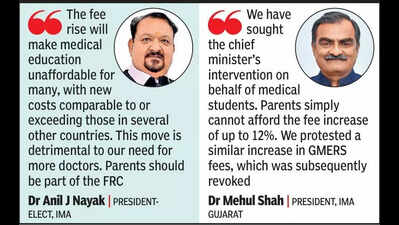Medical education in Gujarat now costs as much as studying in Russia, Georgia | Ahmedabad News - Times of India

SLUG: FEE HIKEAhmedabad: A significant fee hike in Gujarat's private and semi-govt medical colleges has drawn sharp criticism from medical fraternity and political leaders, who say the move makes studying medicine in the state either comparable or costlier than in countries like Georgia, Russia, and Uzbekistan.
The fee regulation committee (FRC) revised medical course fees upward by as much as 12% this week, putting management quota seats at some private colleges above Rs 1 crore. Even govt quota seats cost more than Rs 57 lakh in some colleges. The Indian Medical Association says this will push aspiring doctors to seek cheaper options overseas.Every year, around 15,000 students from Gujarat go to pursue MBBS degrees in countries Russia, Georgia, Bosnia, Bulgaria, Kazakhstan, Uzbekistan, Nepal, and Bangladesh, where colleges offer full medical degrees for lower fees and lower academic barriers for admissions.
Experts believe the fee hike will accelerate the exodus of students to these countries.An expert said, "In India, students face immense competition, and admissions are mostly based on merit. However, getting into these foreign medical colleges is relatively straightforward and does not depend on merit. The average cost for a medical degree (five-year course) in Eastern Europe ranges between Rs 40-50 lakh, with Russia averaging around Rs 30 lakh, and Nepal and Bangladesh between Rs 38-40 lakh.
An Ahmedabad-based immigration consultant told TOI that before the Russia-Ukraine conflict, Ukraine was a favoured destination for students pursuing medicine from Gujarat and, by extension, India. "But even today, about 15,000 students from the state pursue medical education abroad," said the consultant.Students in countries such as Georgia are often trained for exams such as the Foreign Medical Graduate Examination (FMGE) in India after their return.
For Europe and the US, students prepare for the United States Medical Licensing Examination (USMLE) and Professional and Linguistic Assessments Board (PLAB), they added."The students work hard for two or more years for NEET and then compete for coveted govt quota seats. While there is an increase in seats, there have been no new govt-run medical colleges in the past 10 years. In such a scenario, students have no option but to opt for GMERS or private colleges," said an educationist. "After a doctor spends lakhs and crores on education, we expect them to serve society selflessly. We must provide a level-playing field to aspirants.
"












